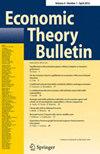高校招生问题中唯一且学生高效的稳定匹配的一个简单充分条件
IF 0.5
Q4 ECONOMICS
引用次数: 7
摘要
想想大学录取问题。假设(学生和大学)的偏好是以学生为导向的,即当两个学生对两所大学的排名不一致时,这两个学生中的每一个都比另一个学生更喜欢他所喜欢的大学。我们表明,当偏好定向时,存在唯一的稳定匹配,并且没有其他匹配,稳定与否,每个学生都弱偏好。本文章由计算机程序翻译,如有差异,请以英文原文为准。
A simple sufficient condition for a unique and student-efficient stable matching in the college admissions problem
Consider the college admissions problem. Let us say that (student and college) preferences are student-oriented iff whenever two students disagree about the ranking of two colleges, each one of the two students is ranked higher by the college he prefers than the other student. We show that when preferences are oriented there is a unique stable matching, and that no other matching, stable or not, is weakly preferred by every student.
求助全文
通过发布文献求助,成功后即可免费获取论文全文。
去求助
来源期刊

Economic Theory Bulletin
ECONOMICS-
自引率
0.00%
发文量
25
期刊介绍:
The purpose of Economic Theory Bulletin is to provide an outlet for research in all areas of Economics based on rigorous theoretical reasoning. The Economic Theory Bulletin together with Economic Theory are the official journals of the Society for the Advancement of Economic Theory.
The Economic Theory Bulletin is intended to publish:
1. Short papers/notes of substantial interest. Content is subject to the same standards as Economic Theory: research in all areas of economics based on rigorous theoretical reasoning and on topics in mathematics that are supported by the analysis of economic problems. Published articles contribute to the understanding and solution of substantive economic problems. Theory papers with the substance and style for other journals that specialize in short papers are welcomed. Corollaries of already known results in the literature are not appropriate for publication.
2. Survey papers that clearly picture the basic ideas at work in the area, the essential technical apparatus that is used and the central questions that remain open.
 求助内容:
求助内容: 应助结果提醒方式:
应助结果提醒方式:


